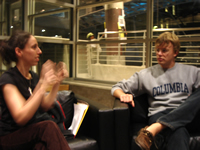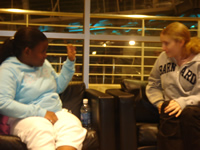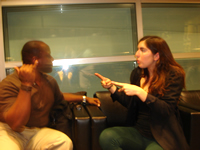CU Sign's New Initiative
**Recent Developments**
February 2009: CU Sign's initiative in the news! Read more about it here.
 CU Sign is thrilled to announce that on April 18th 2008, the Barnard Committee on Instruction approved a resolution granting elective credit to students who have taken courses in American Sign Language. From now on, Barnard students will be able to receive academic credit for courses taken in ASL, at accredited institutions. Even though the resolution does not allow for these courses to count toward completion of the general education language requirement, we are hopeful that in time this will be accomplished, too.
CU Sign is thrilled to announce that on April 18th 2008, the Barnard Committee on Instruction approved a resolution granting elective credit to students who have taken courses in American Sign Language. From now on, Barnard students will be able to receive academic credit for courses taken in ASL, at accredited institutions. Even though the resolution does not allow for these courses to count toward completion of the general education language requirement, we are hopeful that in time this will be accomplished, too.
CU Sign's New Initiative
 CU Sign's New Initiative
CU Sign’s new initiative has made its first major step forward. In Fall 2006 we began an initiative to bring American Sign Language (ASL) to Barnard College, Columbia College, General Studies, and the School of Engineering and Applied Science. Although ASL classes are taught at Teachers College, the $935 per-credit fee prohibits many undergraduates from taking advantage of these courses. CU Sign has been determined to partner with the administration in order to make ASL courses available to students.
CU Sign's New Initiative
CU Sign’s new initiative has made its first major step forward. In Fall 2006 we began an initiative to bring American Sign Language (ASL) to Barnard College, Columbia College, General Studies, and the School of Engineering and Applied Science. Although ASL classes are taught at Teachers College, the $935 per-credit fee prohibits many undergraduates from taking advantage of these courses. CU Sign has been determined to partner with the administration in order to make ASL courses available to students.
Why teach ASL at Columbia?
Columbia currently offers a wide range of languages for study and we strongly believe ASL should be included among them. It is estimated that there are between 500,000 and 2 million users of ASL in the United States alone (more than Hebrew, Greek, and Hindi, all languages taught at Columbia). ASL is indeed a “true” language, containing morphology, semantics, syntax and pragmatics just like spoken languages. Deaf culture and history are fascinating, and extremely different from North American mainstream culture. Deaf culture and ASLhave been popular fields of academic study at universities such asBrown, Yale, Stanford, University of Chicago, University of Pennsylvania, and NYU. In order for Columbia to maintain its status as a world-class university, it should keep up with its competitors and offer courses in this growing field.
What are the administration's arguments against offering ASL and what do we think about them?
- The administration is unsure as to whether ASL meets the criteria for a foreign language, as the objective of the requirement is to allow students to experience a different culture.
American Deaf Culture is radically different from “mainstream” North American culture. Two prominent examples include Deaf Literature (including Deaf poetry and storytelling), and regional dialects reflecting diverse cultural variants. Additionally, the equivalent of “social class” in US culture, could be "classes" of signers, some more integrated and accepted into traditional Deaf culture than others. (ex. Deaf signers with Deaf parents, CODAs, Deaf children of hearing parents (which divides into those that attended Deaf schools from the start and those that were mainstreamed), Deaf children of hearing parents who sign vs. those that don't sign, Gallaudet grads, Deaf people with cochlear implants, Hard of Hearing people and many more.)
- The administration believes ASL is too close to English to be offered as a foreign language.
ASL's grammar and syntax are entirely independent from those of English. While there are sign languages based on English, ASL is not one of them. In fact, ASL is closer to French than English.
- The administration thinks that not enough students would be interested in ASL courses because there aren't many Deaf students at Columbia.
Not only Deaf students would be interested in taking ASL. There are approximately three hundred people on CU Sign's listserv, the vast majority of them hearing! Students may want to take ASL for any number of reasons, just as a student might want to take French even if he or she is not French. What is more, approximately five hundred people signed CU Sign’s petition (Fall 2006).
 How can we bring ASL to Columbia?
How can we bring ASL to Columbia?
Currently the CU Sign executive board has been regularly meeting with administrators to discuss the institution of ASL courses. Come to our weekly meeting or contact a board member if you are interested in helping our cause.
